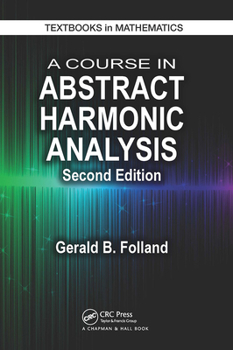A Course in Abstract Harmonic Analysis
A Course in Abstract Harmonic Analysis is an introduction to that part of analysis on locally compact groups that can be done with minimal assumptions on the nature of the group. As a generalization of classical Fourier analysis, this abstract theory creates a foundation for a great deal of modern analysis, and it contains a number of elegant results and techniques that are of interest in their own right.
This book develops the abstract theory along with a well-chosen selection of concrete examples that exemplify the results and show the breadth of their applicability. After a preliminary chapter containing the necessary background material on Banach algebras and spectral theory, the text sets out the general theory of locally compact groups and their unitary representations, followed by a development of the more specific theory of analysis on Abelian groups and compact groups. There is an extensive chapter on the theory of induced representations and its applications, and the book concludes with a more informal exposition on the theory of representations of non-Abelian, non-compact groups.
Featuring extensive updates and new examples, the Second Edition:
Adds a short section on von Neumann algebras Includes Mark Kac's simple proof of a restricted form of Wiener's theorem Explains the relation between SU(2) and SO(3) in terms of quaternions, an elegant method that brings SO(4) into the picture with little effort Discusses representations of the discrete Heisenberg group and its central quotients, illustrating the Mackey machine for regular semi-direct products and the pathological phenomena for nonregular onesA Course in Abstract Harmonic Analysis, Second Edition serves as an entr e to advanced mathematics, presenting the essentials of harmonic analysis on locally compact groups in a concise and accessible form.





